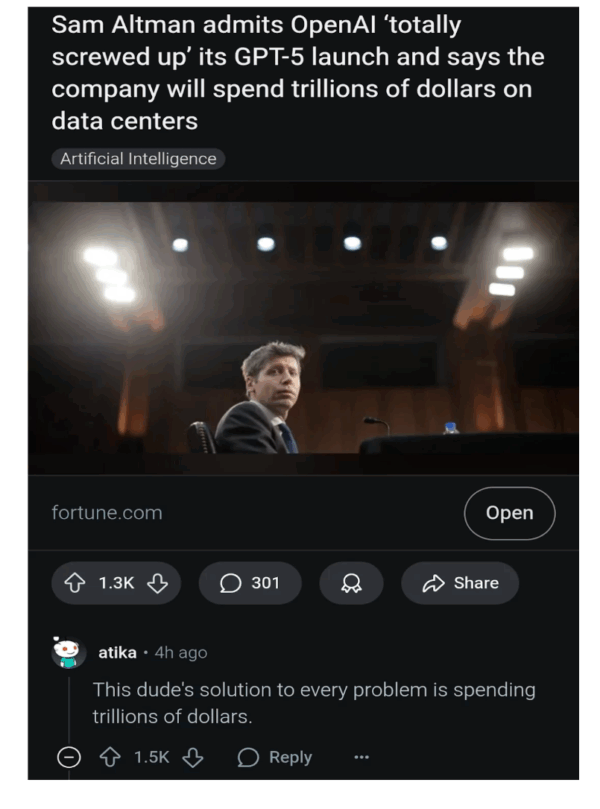The Market's Dangerous AI Delusion
Image Source: Unsplash
The entire marketplace is now based around one company that isn't even technically for-profit yet.
Microsoft (MSFT) gaps up 3% on partnership news. PayPal (PYPL) rallies on collaboration announcements. Oracle mortgages its entire corporate existence building infrastructure.
Every major tech move revolves around developments from one entity.
And that entity literally doesn't exist as a real company yet.
OpenAI is still structured as a non-profit that they're frantically trying to recapitalize into an actual business.
We're watching trillion-dollar public companies make existential bets on a legal entity that hasn't figured out how to be a real business.
How do you own 27% of a company that doesn't exist and is not for profit?
The Circle of Life Ponzi
Take the money and give it to Nvidia (NVDA). Then Nvidia gives the money to Core Weave who spends it back with OpenAI.
Then another capital raise for OpenAI, more money for AI, then back to Nvidia.
It's the same trillion dollars passing in a circle between the same players. Everyone's getting rich trading the same money back and forth, but nobody's creating anything fundamentally new.

Oracle's Make-or-Break Gamble
Oracle (ORCL) has done "absolutely massive bond offerings" - net debt balance of $95 billion compared to Amazon's $30 billion, and Amazon's way bigger.
Oracle went all-in with debt they don't have, building server farms they can't possibly build, powered by electricity that doesn't exist.
They realized they were getting sidelined like Cisco (CSCO) and Intel (INTC) - dead tech companies that missed the wave.
So they threw everything at the AI trade. Their entire survival depends on this humongous debt offering working out.
When the OpenAI trade starts coming apart, Oracle stands the most to lose because their whole company is on the line. They're not diversified like the others - they're pure play AI infrastructure or bust.
Government Backstop Inevitability
This will come apart at the seams. The federal government will step in citing "national security" just like they saved financials in 2008. They're already investing in companies like Intel. We might be nine months to a year from OpenAI being partially owned by the federal government.
Private company builds hype → Takes massive risks → Government bailout → "I'm from the government, I'm here to help."
Trading the Delusion: Risk Management Over Convictions
Given this level of market absurdity, risk management becomes everything. Use defined risk spreads.
When Microsoft gaps up $15 on partnership announcements, the math is simple: maybe it goes up another $5, but it could easily give up the full $15 and reverse.
Perfect setup for a bear put spread - buy the 545 puts, sell the 537.50 puts, three days out.
You're not risking the full $347 unless you hold to expiration. You're riding the spread intraday, capturing the mathematical edge without getting destroyed if you're wrong about timing. The stock's up 3% - phenomenal risk/reward ratio even fighting news flow.
The $2,000 Account Reality Check
Most traders don't have massive accounts. That's exactly when spreads become essential. In a smaller account, you can't afford to be wrong on naked positions when the entire market is built on delusion.
Would I short Microsoft shares outright in a bigger account? Absolutely. But spreading the risk lets you participate in the mathematical edge without risking account destruction.
Volume Tells the Real Story
Markets rallied yesterday on anemic volume - some minutes saw only 567 contracts in the entire S&P futures market. I've personally traded more than that in one minute. When moves happen on no volume, they're artificial and unsustainable.
The market making side needs hedges, so they're forced to sell into selling, and volume starts picking up. That's when "the beast awakens" and reality reasserts itself.
Christmas Trees: Systematic Beats Speculation
Systematic strategies with proven track records keep working. Christmas trees - 98% success rate, 10-12 trades per year, mathematical edges that don't depend on guessing which AI partnership gets announced next.
Speculation vs. systematic edge. Narrative-driven gambling vs. probability-based trading. Account-destroying naked positions vs. defined risk spreads.
The Bottom Line
We're living through mass delusion where the biggest public companies in the world are making trillion-dollar bets on a legal entity that hasn't figured out how to profit from its own existence.
When your bull market depends on a company that technically can't even profit, and everyone's passing the same money in circles, you're watching the setup for an inevitable reckoning.
But here's the trader's edge: When absurdity reaches this level, mathematical risk/reward setups become more valuable than market predictions.
Use spreads.
Define your risk.
Don't care about being right about direction - care about surviving when the music stops. Oracle will be exhibit A in why betting your entire company on recycled AI hype was the ultimate cautionary tale.
More By This Author:
The Hidden Trades Behind Today's Rally
From $3 To $22 In Two Days
And There Goes Tech, Again
Neither TheoTrade nor any of its officers, directors, employees, other personnel, representatives, agents or independent contractors is, in such capacities, a licensed financial adviser, registered ...
more



